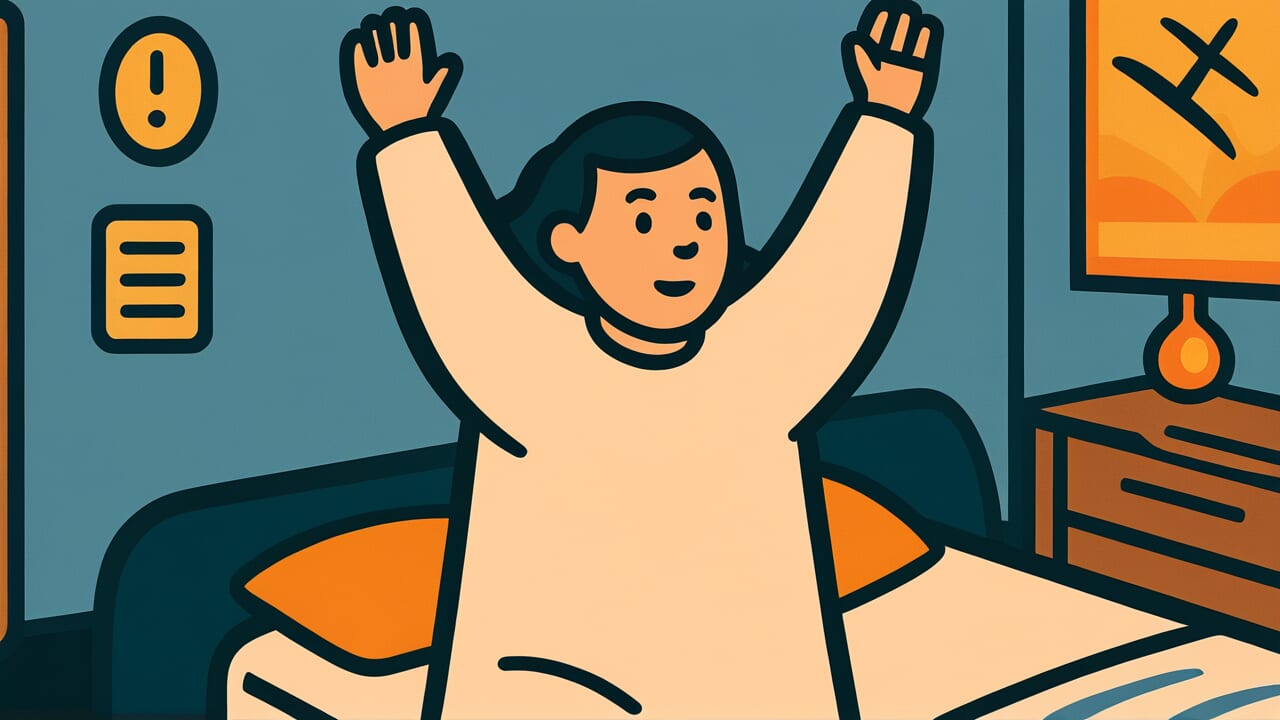How to Read “A guest’s early rising”
Kyaku no asaoki
Meaning of “A guest’s early rising”
“A guest’s early rising” means that when you stay at someone else’s house as a guest, waking up early in the morning reveals an underlying discomfort or restlessness in your heart.
No matter how close you are to your host, and no matter how warmly they welcome you, that place is not your true home. This subtle psychological state shows itself through the act of waking up early.
This proverb describes the mental state of someone staying at another person’s house. On the surface, they may appear grateful and relaxed, but deep down they feel tension and hesitation.
Even today, anyone who has stayed at a friend’s or relative’s house can understand this feeling. Someone who sleeps in late at home will strangely wake up early at someone else’s house.
This happens because your body unconsciously senses “this is not my place.”
Origin and Etymology
No clear written records explain the origin of this proverb. However, it is deeply connected to Japan’s traditional culture of hospitality toward guests.
Since before the Edo period, hosting guests overnight has been an important social custom in Japan. Hosts were expected to provide the best hospitality, and guests were expected to behave politely.
Yet no matter how politely you are treated, sleeping at someone else’s house creates a feeling that you are not in your proper place.
The word “asaoki” (early rising) refers to more than just waking up early. At your own home, you can wake up slowly and start your day at a natural rhythm.
But when staying as a guest, some tension exists in your heart. This makes you unconsciously wake up early.
Our ancestors who observed this phenomenon sharply grasped the essence of human psychology. No matter how warmly you are welcomed, the fact that you are in someone else’s space creates restlessness deep in your heart.
This proverb concisely expresses how that restlessness appears as the concrete action of waking up early in the morning.
Usage Examples
- When I stayed at my relative’s house, “a guest’s early rising” made me wake up two hours earlier than usual
- Waking up at my friend’s house when no one else is awake yet is what they call “a guest’s early rising”
Universal Wisdom
The proverb “a guest’s early rising” teaches us about the deep connection between the human mind and body, and the essential importance of the concept of “belonging.”
We are social creatures who value relationships with others. But at the same time, we need our own safe space, a place where we can truly relax.
This proverb shows that no matter how friendly a relationship appears on the surface, the human subconscious sensitively detects the fact that “this is not my territory.”
What’s interesting is that this feeling works at an unconscious level, not a conscious one. Even though the guest feels grateful and comfortable, the body responds honestly.
Waking up early in the morning is an expression of the vigilance and tension hidden deep in the heart.
This universal truth highlights the instinctive part of human nature. We can only truly relax when we have our own territory, our own nest.
This is an animal instinct, an aspect of human nature that doesn’t change no matter how advanced civilization becomes.
This proverb has been passed down for so long because it perfectly captures a universal feeling that everyone experiences. The depth of human understanding is condensed into just five characters.
When AI Hears This
Humans are creatures who overestimate tomorrow’s version of themselves. Tonight you decide “I’ll wake up early tomorrow,” but tomorrow morning’s you easily breaks that promise.
In behavioral economics, this is called “present bias.” The immediate pleasure of staying in your comfortable bed outweighs the future benefit of waking up early.
What’s interesting is the structure of the solution this proverb presents. A guest functions not as a mere visitor, but as “an external force you cannot cancel by your own will.”
In other words, you impose on yourself the social cost of embarrassment if you oversleep. This is exactly what behavioral economist Richard Thaler called a “commitment device.”
For example, it’s the same principle as prepaying for a gym membership to make yourself feel like you’re losing money if you don’t go.
What’s even more noteworthy is the efficiency of this mechanism. Modern alarm apps can be turned off by yourself, but the device of being a guest cannot be disabled by your own will.
The irrevocable promise of others’ expectations forcibly controls your future self. People in the Edo period, without knowing neuroscience or behavioral economics, built the optimal social device into daily life to compensate for human weakness of will.
Lessons for Today
What this proverb teaches modern people is the importance of having your own place. No matter how rich your relationships are, without a space of your own where you can truly relax, you remain in a constant state of tension.
In modern society, we spend much of our time as “guests” at work and in social situations. At the workplace and in social settings, we constantly play roles and pay attention to those around us.
That’s why securing a place where you can truly relax, a space where you can be yourself, is essential for mental health.
This proverb also contains a lesson for those who host others. Understanding that guests cannot completely relax, no matter how much care you show, allows you to respond with greater consideration.
It’s important to be mindful of their early rising and to respect their privacy.
Cherish your own “nest.” It is the only place where you can return to your true self. And at the same time, don’t forget to respect others’ “places of belonging.”



Comments